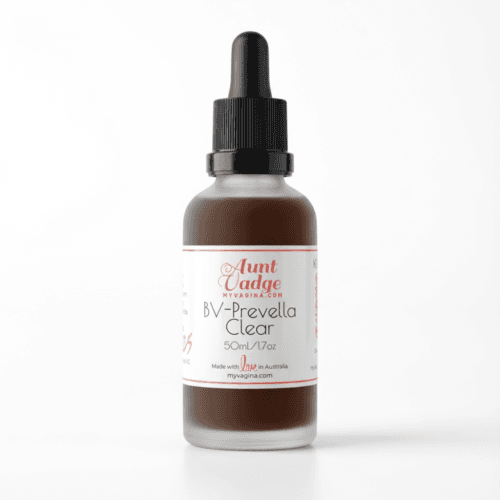Prevotella bivia is a gram-negative anaerobic bacteria that can cause or is associated with pelvic inflammatory disease (PID) and bacterial vaginosis (BV).
Species in the Prevotella family are known to cause respiratory, mouth and vaginal infections, though some species also reside harmlessly in the gut.
P. bivia is a pH-sensitive microbe, which has implications for those with BV, since BV is typically a high-pH condition. Most of the bacteria that cause BV actively create a less acidic vaginal environment, which is a deterrent to protective, acid-loving bacteria like lactobacillus.
Whether P. bivia causes or contributes to a less acidic vaginal environment is unknown, but this study shows us that this disruptive vaginal bacteria grows better in a less acidic environment.
Treating Prevotella bivia vaginal infections
Using pH-lowering treatments could be useful in treating BV related to P. bivia, while working to increase acid-producing lactobacilli species.
My Vagina’s specially developed Prevotella treatment, Aunt Vadge’s BV-Prevella Clear, targets Prevotella and other BV-causing bacteria, while actively promoting lactobacilli growth and lactic acid. Aunt Vadge’s BV-Prevella Clear is pH balanced at around 4.0-4.5.
Key findings of the P. bivia study1 on pH changes
- At a pH of 6.0 – Prevotella CFU (colony-forming units) were observed at 7.93 per ml
- At a pH 5.0-5.5 – CFU decreased by 1.39 CFU/ml/day
- A vaginal microbiome colonised by protective lactobacilli species has a pH of 3.8-4.5
Interestingly in this study, Prevotella spp. was identified as one of five major factors that could be used to calculate the likelihood that any given microbiota is within the ‘normal’ range; an unexpected finding, since P. bivia is typically present 100 times less than other dominant organisms.
In observations of over 2,000 patients, P. bivia was frequently isolated as a commensal in healthy, non-pregnant, fertile-aged women. This tells us that Prevotella species are naturally in and around the vagina, and that’s not necessarily a bad thing.
But, when combined with vaginal symptoms, Prevotella might be piggy backing on the higher pH driven by other BV-causing bacteria.
Bacterial vaginosis with P. bivia in it
Those diagnosed with BV tend to have altered vaginal microbiomes than healthy people, with the BV vagina dominated by anaerobic gram-negative rod bacteria like Prevotella spp. and Gardnerella vaginalis in much higher concentrations than in asymptomatic vaginas.
Prevotella causes an ammonia-like vaginal odour and tends to result in inflammation when in high enough colony counts.
References
- 1.Pybus V, Onderdonk AB. The Effect of pH on Growth and Succinate Production byPrevotella bivia. Microbial Ecology in Health and Disease. Published online January 1996:19-25. doi:10.3109/08910609609167725








